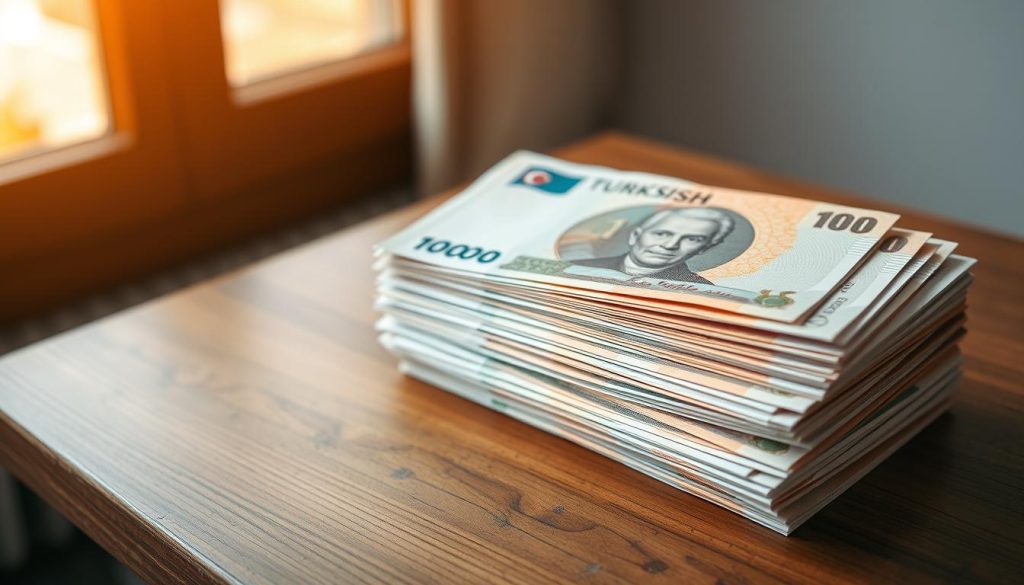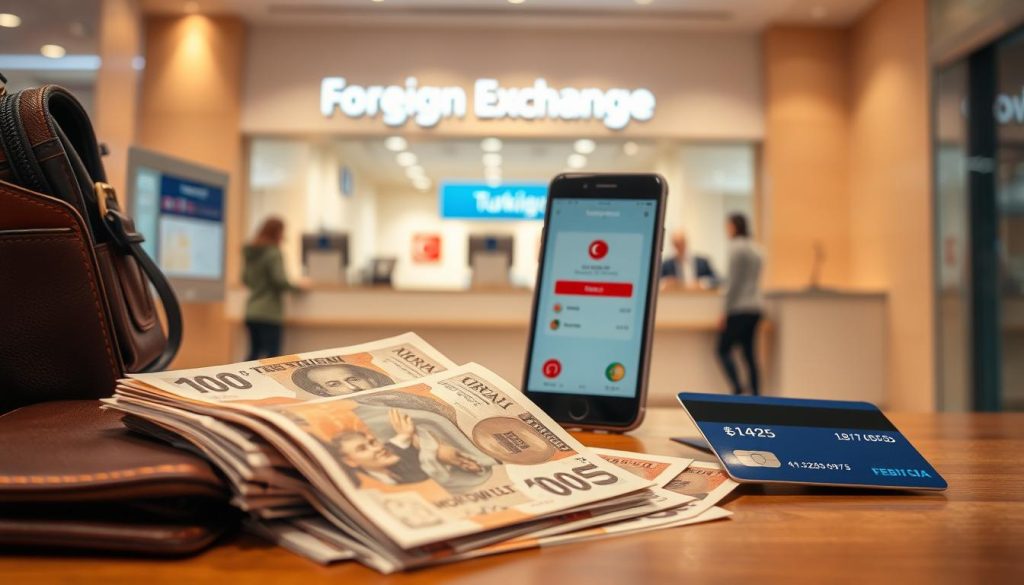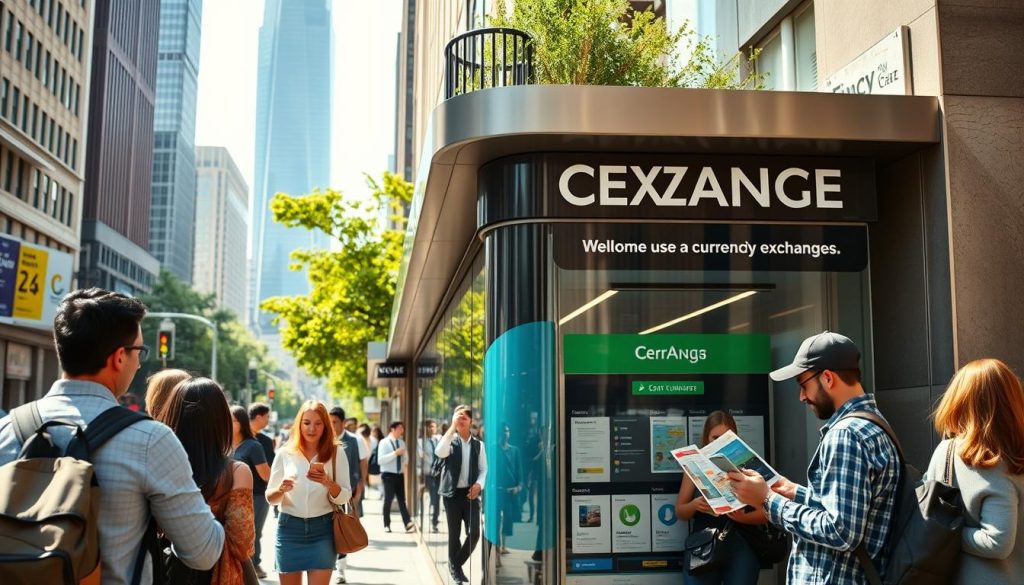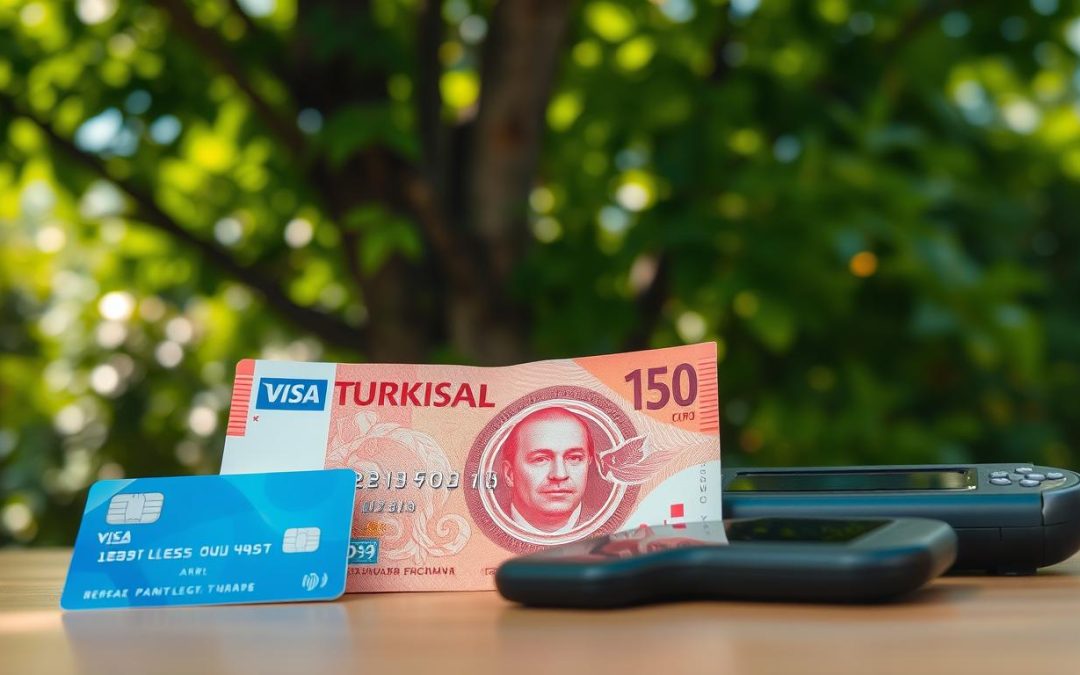Have you ever wondered how understanding a country’s currency can transform your travel experience? The Turkish lira is more than just money—it’s a gateway to exploring Turkey’s rich culture and vibrant markets. Knowing how to manage your finances can make your trip smoother and more enjoyable.
When traveling, the exchange rate plays a crucial role in determining your costs. Carrying cash in Turkish lira is essential, as it’s widely accepted across the country. However, using cards can also save you from unnecessary fees, especially in tourist areas.
This guide will help you navigate the best ways to exchange money, use cards, and manage your budget effectively. Whether you’re shopping in bazaars or dining in restaurants, being prepared ensures a stress-free journey.
Key Takeaways
- The Turkish lira is the official currency and is widely used for transactions.
- Exchange rates can vary, so compare options to get the best deal.
- Carry cash for smaller purchases and use cards for convenience.
- Be aware of foreign transaction fees when using credit or debit cards.
- Plan your budget to avoid overspending during your trip.
Introduction: The Role of Currency in Your Turkey Journey
Currency is more than just money—it’s a bridge to cultural immersion. When you travel, the Turkish lira becomes your key to unlocking local markets, historic sites, and authentic experiences. Understanding how to use it effectively can transform your trip from stressful to seamless.
The exchange rate plays a significant role in your spending. It can fluctuate daily, so staying informed helps you make smarter financial decisions. Whether you’re shopping in a bustling bazaar or dining at a cozy café, having the right amount of cash ensures smooth transactions.
Banks and exchange offices are your go-to spots for converting your money. They offer competitive rates, especially compared to airport kiosks. Carrying a mix of cash and cards is ideal, as some smaller vendors may not accept electronic payments.
Here’s what you need to know to get started:
- The Turkish lira is the official currency, divided into 100 kurus.
- Exchange rates can vary, so compare options for the best deal.
- Cash is essential for small purchases, while cards are convenient for larger expenses.
By mastering the basics of currency and payment systems, you’ll be well-prepared to explore everything this vibrant destination has to offer.
Understanding Turkish Lira: Currency Basics and Denominations
Getting familiar with the Turkish lira is your first step to a hassle-free trip. This official currency is essential for everything from market shopping to dining out. Knowing its basics ensures you’re prepared for any transaction.
Currency Code, Symbol, and Subunits
The Turkish lira is represented by the code TRY and the symbol ₺. It’s divided into 100 subunits called kuruş. While kuruş coins are still in circulation, they’re rarely used due to their small value.

Available Banknotes and Coins
You’ll encounter coins in 1, 5, 10, 25, and 50 kuruş, as well as 1 lira. Banknotes come in denominations of 5, 10, 20, 50, 100, 200, and 500 lira. Each note features unique designs and security features to prevent counterfeiting.
When handling cash, look for watermarks, holograms, and raised print to ensure authenticity. These features make it easier to spot fake notes and protect your money.
By understanding these basics, you’ll feel more confident managing your finances during your trip. Whether you’re making a small purchase or paying for a larger expense, knowing the currency inside out is key.
Navigating Currency Exchange and Rates in Turkey
Managing your money wisely while traveling can make all the difference. One of the most important aspects of this is understanding how to get the best exchange rate for your currency. This ensures you maximize your spending power and avoid unnecessary fees.
Finding Competitive Exchange Rates
When converting your money, it’s essential to compare different providers. Banks and exchange offices often offer better rates than airport kiosks. For example, the mid-market rate for USD to Turkish lira is around ₺26.54, but this can vary depending on where you exchange your funds.
Here’s a quick comparison of common options:
| Provider | Exchange Rate | Fees |
|---|---|---|
| Banks | ₺26.50 | Low |
| Exchange Offices | ₺26.54 | Moderate |
| Airport Kiosks | ₺25.80 | High |
Monitoring the mid-market rate can help you identify the best time to convert your funds. This rate is the midpoint between the buy and sell prices of a currency on the global market.
Avoiding Unfavorable Airport Rates
Airport exchange kiosks are convenient but often come with high fees and poor rates. Instead, consider exchanging a small amount for immediate needs and waiting to convert the rest at a local bank or exchange office.
Here are a few tips to save money:
- Research rates online before your trip.
- Use ATMs attached to banks for better rates.
- Avoid dynamic currency conversion (DCC) when using cards.
By taking these steps, you’ll ensure your currency exchange is cost-effective and hassle-free.
How to Get Turkish Lira: Pre-Travel Considerations vs. On Arrival Options
Planning your finances before your trip can save you time and money. Whether you exchange currency before departure or wait until arrival, understanding your options ensures you’re prepared for any situation. Let’s explore the pros and cons of each approach.
Exchanging Currency Before Departure
Exchanging money at home offers convenience and peace of mind. You’ll have Turkish lira on hand as soon as you land, which is especially useful for immediate expenses like transportation or meals. Local banks often provide competitive rates, making this a cost-effective choice.
However, keep in mind that not all banks carry foreign currency. You may need to order it in advance, which can take a few days. Additionally, rates at home might not be as favorable as those in your destination. Always compare options to ensure you’re getting the best deal.

Using ATMs, Banks, and Exchange Offices in Turkey
Upon arrival, ATMs are a convenient way to withdraw Turkish lira. They offer competitive exchange rates and are widely available in cities and tourist areas. Look for ATMs attached to banks to avoid high fees from independent operators.
Exchange offices, known as döviz bürosu, are another option. They often provide better rates than airport kiosks. Always check for hidden fees and ensure the office is reputable. Here’s a quick comparison of your options:
| Option | Pros | Cons |
|---|---|---|
| ATMs | Competitive rates, widely available | Potential withdrawal fees |
| Banks | Secure, reliable rates | Limited hours, possible fees |
| Exchange Offices | Better rates than airports | Risk of hidden fees |
By weighing these options, you can choose the method that best suits your needs. Whether you prefer the convenience of pre-travel exchange or the flexibility of on-arrival solutions, being informed ensures a smooth and cost-effective experience.
Using Cards and Cash: Your Payment Options in Turkey
Exploring payment options in a new country can make your trip smoother and more enjoyable. In Turkey, you’ll find a mix of traditional and modern methods to handle your expenses. Knowing when to use cash and when to rely on cards can save you time and money.
Debit, Credit, and Contactless Payment Methods
Major credit cards like Visa and Mastercard are widely accepted in hotels, restaurants, and shops. In urban centers, contactless payments are becoming increasingly popular. This method is not only convenient but also reduces the need for physical cash.
However, it’s always a good idea to carry some Turkish lira for smaller purchases or places that don’t accept cards. Street vendors, local markets, and public transportation often prefer cash transactions. Having a mix of both ensures you’re prepared for any situation.
Practical Tips for Using Cards and Cash
To avoid extra fees, consider using travel-friendly debit cards that offer low or no foreign transaction fees. Notify your bank before your trip to prevent your card from being flagged for suspicious activity. This simple step ensures smooth transactions during your stay.
Here are a few more tips to keep in mind:
- Withdraw larger amounts of cash at once to save on ATM fees.
- Use ATMs attached to banks for better security and rates.
- Carry small bills for tipping and minor expenses.
By understanding these payment options, you can navigate your finances with ease. Whether you’re dining at a restaurant or shopping at a bazaar, being prepared ensures a stress-free experience.
Exploring the Banking Landscape in Turkey
Navigating the banking system in a foreign country can feel overwhelming, but it doesn’t have to be. Turkey’s robust banking network offers secure and reliable services for both locals and visitors. Understanding how to use these services can make managing your finances during your trip much easier.

Local Banks and Their Services
Turkey is home to several well-established banks that cater to a wide range of financial needs. Institutions like Türkiye İş Bankası, Akbank, and Garanti BBVA are trusted names in the country. These banks provide not only currency exchange but also services like ATM withdrawals, account management, and international transfers.
Using a local bank for your financial needs often comes with advantages. For example, banks typically offer better exchange rates and more transparent fees compared to independent exchange offices. This can save you money and ensure a smoother experience during your travels.
“Banks in Turkey are a reliable option for secure currency exchange and financial services, offering competitive rates and convenience.”
Why Choose Banks Over Other Options?
When it comes to managing your currency, banks are often the safest and most cost-effective choice. Here’s why:
- They provide secure transactions with minimal risk of fraud.
- ATMs attached to banks offer better rates and lower fees.
- Banks are widely available in cities and tourist areas, making them convenient.
Here’s a quick comparison of services offered by major banks in Turkey:
| Bank | Services | Exchange Rates |
|---|---|---|
| Türkiye İş Bankası | Currency exchange, ATMs, international transfers | Competitive |
| Akbank | ATMs, account management, loans | Transparent |
| Garanti BBVA | Currency exchange, credit cards, online banking | Favorable |
By choosing a reputable bank, you can ensure your financial transactions are secure and cost-effective. Whether you’re exchanging currency or withdrawing cash, these institutions are designed to meet your needs.
Tips for Using Banks in Turkey
To make the most of your banking experience, keep these tips in mind:
- Notify your bank before traveling to avoid card issues.
- Use ATMs attached to banks for better security and rates.
- Carry a mix of cash and cards for flexibility.
Understanding the banking landscape in Turkey can enhance your travel experience. With reliable services and competitive rates, you’ll feel confident managing your finances throughout your journey.
Cultural Insights: Tipping, Bargaining, and Money Etiquette in Turkey
Understanding local customs around money can enrich your travel experience. In Turkey, how you handle currency reflects respect for cultural norms. From tipping in restaurants to bargaining in bazaars, these practices are part of daily life.
Understanding Local Customs and Etiquette
Tipping is a common practice in Turkey, especially in the service industry. In restaurants, a tip of 10%-15% is customary if the bill doesn’t include a service charge. For taxi drivers, rounding up the fare is appreciated, while hotel staff often receive small cash tips for their assistance.
Here’s a quick guide to tipping etiquette:
- Restaurants: 10%-15% of the bill.
- Taxi drivers: Round up the fare.
- Hotel staff: 10-20 lira for exceptional service.
“Tipping is a way to show appreciation for good service, but it’s always done discreetly and respectfully.”
Effective Bargaining in Markets and Bazaars
Bargaining is an art in Turkey, particularly in bustling markets like Istanbul’s Grand Bazaar. It’s a cultural tradition that adds to the shopping experience. Start by offering half the asking price and negotiate politely until you reach a fair agreement.
Here are some tips for successful bargaining:
- Be friendly and respectful during negotiations.
- Know the approximate value of the item beforehand.
- Don’t rush—take your time to enjoy the process.
By mastering these customs, you’ll not only save money but also connect more deeply with the local culture. Whether you’re dining out or shopping, these insights ensure a respectful and enjoyable travel experience.
Essential Tips for Currency Exchange and Card Usage
Making the most of your money while traveling starts with smart financial planning. Whether you’re exchanging currency or using your card, understanding the process can save you time and stress. Here’s how to navigate the financial landscape effectively.
Comparing Providers and Avoiding Hidden Fees
When exchanging money, it’s crucial to compare providers to get the best exchange rate. Banks and reputable exchange offices often offer better rates than airport kiosks. Always check for hidden fees, as these can add up quickly and impact your budget.

One way to ensure you’re getting a fair deal is to check the mid-market rate before committing to a transaction. This rate reflects the midpoint between the buy and sell prices of a currency on the global market. Online converters can help you stay informed and make smarter financial decisions.
Securing Your Transactions
Using your card abroad can be convenient, but it’s essential to avoid common pitfalls. Dynamic currency conversion (DCC) is one to watch out for. This option allows merchants to charge you in your home currency, but the rates are often unfavorable. Always choose to pay in the local currency to save on fees.
Here are some practical tips to secure your transactions:
- Notify your bank before traveling to prevent card issues.
- Use ATMs attached to banks for better security and lower fees.
- Carry a mix of cash and cards for flexibility in different situations.
By following these steps, you’ll ensure your financial experience is smooth and cost-effective. Whether you’re exchanging money or using your card, careful planning minimizes risks and maximizes your spending power.
Turkey: Ultimate Travelers Guide to Currencies & Payments
Smart financial planning is the key to a stress-free and enjoyable trip. Understanding the currency and payment options in Turkey ensures you can focus on exploring rather than worrying about finances. This guide recaps the essential strategies for managing your money effectively during your stay.
One of the first steps is familiarizing yourself with the Turkish lira. It’s the official currency and is widely accepted across the country. Knowing its denominations and how to handle cash ensures smooth transactions, especially in local markets and smaller shops.
When it comes to exchanging money, comparing providers is crucial. Banks and reputable exchange offices often offer better exchange rates than airport kiosks. Here’s a quick comparison of your options:
| Provider | Exchange Rate | Fees |
|---|---|---|
| Banks | ₺26.50 | Low |
| Exchange Offices | ₺26.54 | Moderate |
| Airport Kiosks | ₺25.80 | High |
Using cards is another convenient option, especially in urban areas. Major credit cards like Visa and Mastercard are widely accepted. However, carrying some cash is essential for smaller purchases or places that don’t accept electronic payments.
Here are a few tips to make the most of your financial planning:
- Notify your bank before traveling to avoid card issues.
- Use ATMs attached to banks for better security and rates.
- Carry small bills for tipping and minor expenses.
Understanding local customs, such as tipping and bargaining, also enhances your experience. In restaurants, a tip of 10%-15% is customary, while rounding up taxi fares is appreciated. Bargaining in markets is a cultural tradition that can save you money if done respectfully.
By applying these insights, you’ll ensure a smoother and more enjoyable travel experience. Whether you’re exchanging money, using cards, or embracing local practices, being prepared makes all the difference.
Conclusion
Mastering the basics of currency and payment methods is essential for a smooth and enjoyable trip. Understanding the local exchange rate and how to access money efficiently can save you time and stress. Whether you’re using a debit card or carrying cash, being prepared ensures you’re ready for any situation.
Banks and exchange offices often offer the best rates, so compare options before converting your funds. Using ATMs attached to reputable banks can also help you avoid unnecessary fees. A balanced approach with both cash and cards is ideal, especially in markets or smaller shops where electronic payments may not be accepted.
Don’t forget to consider local customs, like tipping and bargaining, to show respect and enhance your experience. A 10%-15% tip in restaurants and rounding up taxi fares are common practices. Bargaining in bazaars can also be a fun way to connect with the culture while saving money.
By following these tips, you’ll navigate your finances with confidence. Share this guide with fellow travelers and keep these strategies in mind for future trips. Careful planning ensures a stress-free and memorable journey.
The above is subject to change.
Check back often to TRAVEL.COM for the latest travel tips and deals.
Here are some Tours & Sightseeing suggestions that might pique your interests!
